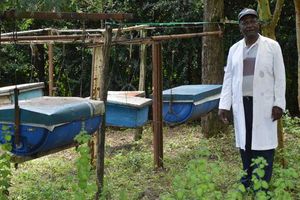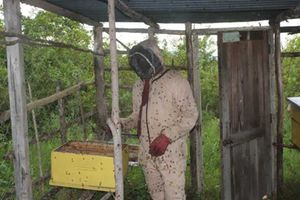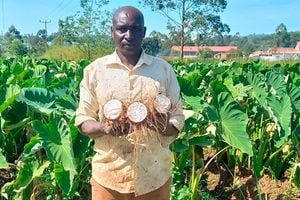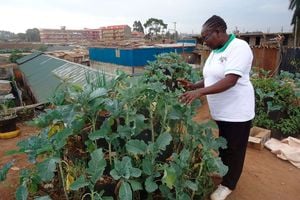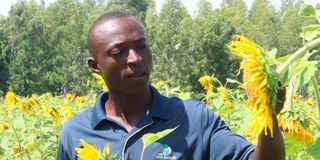
Julius Were at his sunflower farm in Kotieno Village, Homa Bay County.
For good honey yields, the hive should be near flowers. A group of young farmers in Kasipul, Homa Bay County, got the formula right after some struggles and planted flowers next to its apiary.
The farm belonging to group chairman Julius Were is near the hives. Were says it is like killing two birds with one stone.
Were gets honey from the bees that feed on nectar. He also harvests the sunflower seeds and to a processor.
Nyagunde Youth Group is based in Kotieno village, Rachuonyo South Sub-County. The group has 18 members and a similar number of hives, with many also growing sunflower.
The venture started in 2020 shortly after the young people sat their Kenya Certificate of Secondary Education tests at Karabok School.
They wanted to start making money, mainly from farming even though some had not studied agriculture.
“Farming was our best option. Our parents are farmers so we thought of infusing new ideas into what they did,” Were says.
The team began by establishing a tree nursery, aiming to battle the effects of climate change.
A villager donated land to the group. Unfortunately, the nursery made little profit.
“We faced many challenges. The seedlings would dry or be destroyed by livestock,” Were says.
Then came the Covid-19 pandemic. Next to the nursery was a hive, which to a large extent, helped control animals that would destroy the tree seedlings.
A group member came up with the idea of bee-keeping for honey production. Nyagunde Youth Group shifted from tree-planting to apiculture.
“Honey was in demand at the time. Some people used honey to make concoctions believed to treat coronavirus,” Were says.
Group members raised money from their savings and bought four hives at Sh5,500 each in 2021.
“We also bought a bee suit and gumboots,” Were says.
For about a year, the group engaged in honey production but the business was not doing well. The young people realised they had not provided bees with flowers. Group members registered for a day-long training that changed their business model.
“We used to think bees would take care of themselves and had no idea they needed flowers and water,” he says.
Group members were invited for another training as the Homa Bay devolved government recruited sunflower farmers. Later, Nyagunde Youth Group established a sunflower farm after getting 80 kilos of seeds.
Following the success of the venture, Were took the decision to use his family maize farm for sunflower production.
“I planted sunflowers on a quarter acre and got more than 100 kilos of seeds. The bees get nectar from the sunflower,” he says.
Mr Zachary Odero, an agronomist, praises the growing of sunflower near hives, saying bees should not cover long distances when searching for nectar.
“Water should be available as is it key in honey production,” Odero says.
In May, the devolved government of Homa Bay said it was making efforts to be a major producer and supplier of sunflower. More than 7,000 farmers were given seeds.
Some 27,25 tonnes of seeds was procured by the county government for the programme meant to promote the processing of edible oils.
“Our goal is to produce high-quality edible oil, marking a step towards ensuring food security and economic stability,” Governor Gladys Wanga said.
Apart from known crops like maize, beans, sorghum and sugarcane, the county government wants families in Homa Bay to grow high-value crops.
Farmers are encouraged to grow groundnuts, palm oil, soya beans, canola and cotton for the production of cooking oil. Authorities say they have identified markets for these crops.
Sunflower growers have formed a cooperative society, processing the seeds using a portable machine.
The oil is then packaged and sold at local markets through a group known as Nyawest. A kilogramme of unprocessed sunflower seed is Sh50.
Governor Wanga urged the cooperative society to increase the purchase price by at least Sh5.
“What they process is not different from known brands but needs to be packaged properly,” she said.
County government authorities say such ventures can help eliminate poverty and create wealth.

